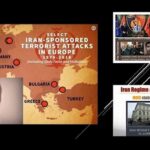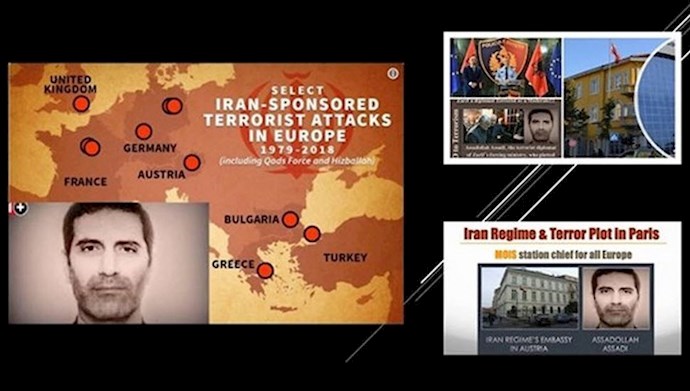EUROPE AND IRAN: WHEN BLINDNESS OPENS THE DOORS TO TERRORISM


Last month, the Belgian trial of Assadolah Assadi and three other Iranians accused of planning a bomb attack in Paris in 2018 began. As of 2015, Assadi was the senior officer of the Iranian Ministry of Intelligence and Security in Europe, at the era operating under the cover diplomacy at the Iranian embassy in Vienna. He is the first Iranian government official to be tried by an EU country for terrorist offenses, despite numerous attack attempts on EU soil ordered by Tehran.
State-supported terrorism is not only an act in itself, but also an instrument of national power and coercion. Together, these plots were a malicious message and a clear threat to Europe that were sadly received and carried out as planned in London, Berlin, Paris and Brussels.
Assadi's failed plan was allegedly ordered by Iranian President Hassan Rouhani and approved by Supreme Leader Ali Khamenei. Its target was a rally by the National Council of Resistance of Iran, in the presence of 80,000 supporters and former Canadian Prime Minister Stephen Harper, President Trump's lawyer Rudy Giuliani and several members of the British and European Parliament. The explosives, allegedly brought to Europe from Iran by Assadi on a commercial flight, were TATP, the same type used to kill 22 people and injure 800 in a jihadist attack on the Manchester Arena, UK, in 2017 and London 7 / 7 attacks that killed 52 people and wounded 700 in 2005. The message was clear. In March, Assadi, who refused to attend his trial asking for diplomatic immunity, threatened retaliation if he was convicted. The Iranian government has also warned of a "proportionate response" to the countries involved in the process.
The Assadi bombing was prevented by European security authorities using Israeli-supplied intelligence. Mossad previously relayed intelligence information to the British security agency MI5 which allowed it to halt another explosion in 2015. Terrorists linked to Iranian allies Hezbollah had accumulated three tons of ammonium nitrate in north London – the same material explosive that caused such devastation in Beirut earlier this year. The amount in London was greater than the ammonium nitrate that killed 168 people, injured 680 and damaged hundreds of buildings in the Oklahoma City bombings of 1995.
The same year as the London attempt, another Hezbollah plot was uncovered in Cyprus, also a member of the EU, this time involving 8.2 tonnes of ammonium nitrate, and again revealed to the Cypriot authorities by Mossad. There was also an attempt in Thailand in 2012 and, two years after the London plot was uncovered, indications of a similar plan in New York. The same year as the Thai plot, Hezbollah killed five Israeli tourists and a driver when they attacked a bus in Burgas in Bulgaria, another EU member state.
Iran's organized terrorist attack plans were discovered in Germany in 2017 and Denmark in 2018, both EU members, and also in 2018 in Albania, a formal candidate for EU membership. Two Dutch citizens of Iranian descent were murdered in the Netherlands, another EU state, on orders from Tehran in 2015 and 2017.
The attacks in EU countries since 2015 have all occurred during the period when Britain, France, Germany and the EU were actively involved in JCPOA, the Iranian nuclear deal with the P5 + 1. European reactions were predictably limited , with many suspecting that the weak response was due to a desire to avoid endangering the JCPOA. Until discovered in 2019 by a Daily Telegraph investigation into Hezbollah's terrorist activity in Europe, British authorities kept the 2015 London bomb plot a secret, apparently due to pressure from the Obama administration to delete the details, to avoid compromising the nuclear deal.
Despite, or perhaps because of, such terrorist outrages against them, EU states have always flanked Iran, refusing to follow the United States in reneging on the nuclear deal, which is partly a response to Iranian regional aggression. and the sponsorship of international terrorism. Rather than joining President Trump's "maximum pressure" campaign to change Iran's behavior, Europeans have supported Tehran and undermined the United States, even trying to subvert American economic sanctions by instituting a financial instrument, INSTEX, to enable continued trade with Iran. A choice that would be incomprehensible from the point of view of democracy and security, but which is more than evident if we consider the economic and financial interests of the European industrial and banking system. In the end you want it to be a few more bowler hats in the old continent, especially when it does not aim to target the rich and powerful, but some ethnic minority …
From Gatestone

Thanks to our Telegram channel you can stay updated on the publication of new articles of Economic Scenarios.
The article EUROPE AND IRAN: WHEN BLINDNESS OPENS THE DOORS TO TERRORISM comes from ScenariEconomici.it .
This is a machine translation of a post published on Scenari Economici at the URL https://scenarieconomici.it/europa-ed-iran-quando-la-cecita-apre-le-porte-al-terrorismo/ on Thu, 10 Dec 2020 09:50:00 +0000.
